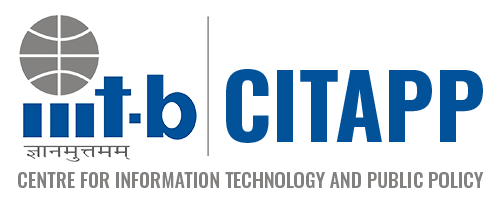The Center for Information Technology and Public Policy (CITAPP)
International Institute of Information Technology Bangalore (IIITB)
organised a talk titled
Did Demonetization Enable Digital Money Transactions in e-Public Services Delivery?
Evidence from Andhra Pradesh, India
by
Dr. Sundar Balakrishna
Director of Electronics Services Delivery and CEO, Andhra Pradesh Information Technology Academy, Government of Andhra Pradesh, Vijayawada
11:15 am on 4 September, 2018 (Tuesday)
Venue: Room 310, IIITB campus
26/C, Electronic City, Hosur Road, Bangalore
About the talk: The Andhra Pradesh Electronic Services Delivery (ESD) project was initiated as a pilot in 1998 in AP (where electricity and telephone bill payment services were offered online) and offers 380 Government-related services (which include electronic delivery of land records, and registration of births, and deaths), and about 250 business-related services (which include bus and train bookings) as of date. The project has won notable awards at the national and international levels. Implemented by the Directorate of ESD-Meeseva of the Government through a public private partnership model, a service charge is levied on each electronic transaction from the availing citizens who normally pay in cash. The average revenue collection per day by ESD-Meeseva for the years 2014-15, 2015-16, and 2016-17 is rupees 6.48 crores, rupees 7.84 crores, and rupees 7.95 crores, which indicates the pervasiveness and popularity of Government electronic services amongst the citizens.
On 8th November 2016, the Government of India demonetized 500 rupees and 1,000 rupees notes of Mahatma Gandhi series, and declared these notes as illegal tender, thereby sucking out rupees 15.46 lakh crores of these high denomination notes, and constituting 86 percent of currency under circulation in the Indian economy. The demonetization created a crisis due to cash crunch, with citizens rushing to banks and automated teller machines (ATM) to deposit invalidated currency and withdraw valid currency for their activities.
To avail a Government service online, the citizen normally pays the service and statutory charges in the cash mode at any of the 6,300 odd ESD-Meeseva kiosks in AP. It may be noted that as with many other Indian states, the economy of AP state is predominantly cash-based. The demonetization created a cash crunch which lasted for several months, and created severe inconvenience to the citizens. The Government and the Directorate, ESD responded by introducing digital payment solutions in the kiosks through several e-Government initiatives. Were these initiatives the first-best solutions? Did these demonetization-induced e-Government initiatives enable a less cash society, and benefit the citizens?
This study looks for some answers through econometric estimation. For this purpose, the study analyses the daily revenue collections in ESD between the period 3rd December 2016 (the date on which digital solutions were introduced) and 15th August 2017 (when currency supply stabilized in the economy) through the cash and digital noncash channels as a time series data. Since there is a bilateral causality between the use of cash and digital payments for Government electronic services by the citizens, vector error correction (VEC) is employed to model this economic phenomenon. The ADF and the AEG tests show that the cash and digital channel streams are I(0) stationery and co-integrated. The total volume of e-public transactions contracted by 15 percent, as compared to the same period last year. Digital cash transactions rose from 25 percent (in November 2016) to about 40 percent (in January 2017), but later stabilized at 20 percent (in March 2017). The VEC analysis shows that the digital cash- and cash-streams seems to affect each other, with one time lag. Contrary to expectations, citizens seem to prefer cash modes of payment to digital payment solutions to avail e-public services.
Speaker Bio: Sundar Balakrishna holds a Bachelors in Engineering (Computer science), a Masters in Business Administration (Post-graduate Diploma in Management) with finance concentration (from Indian Institute of Management (IIM) Indore), and a PhD (Fellow Program in Management) in the Economics area (from Indian Institute of Management Ahmadabad).He is serving in the Indian Forest Service as Chief Conservator of Forests and is currently Director, Electronic Services Delivery, Government of Andhra Pradesh and holding additional position of CEO, Andhra Pradesh Information Technology Academy in the Department of Information Technology, Electronics, and Communications, Government of Andhra Pradesh. He is a visiting faculty (Economics area) at the Indian Institutes of Management Indore, Lucknow, and Trichy and teaches Microeconomics, Environmental and Natural Resources Economics, Economics of Network Industries, Econometrics with R, and Regulatory Economics. He has published in international journals of repute, which includes Vikalpa and the International Forestry Review. His current research interests include applied econometrics, development economics, and e-government.
